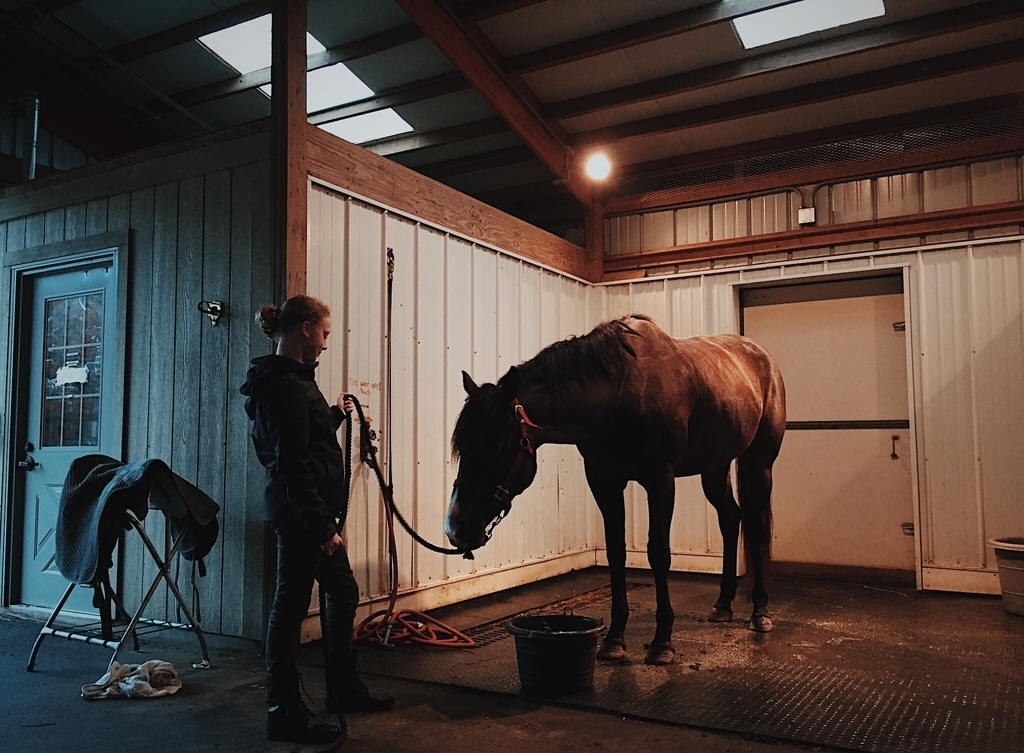American English is chock full of idioms–phrases that have a very specific meaning different from the way they’re worded.
One example is “hold your horses.” If you say this to someone, you’re not really referring to horses: you’re just telling them to wait a moment.
Here are 7️⃣ of our favorite U.S. English idioms and their origin. Some may surprise you… and who knows, you may even learn something 😉.
Hold your horses
“Hold your horses” simply means “slow down” or “stop.” Today, we don’t see too many 🐎 walking the streets–but in the time before cars, they were everywhere.
Horses weren’t just used for personal transportation, either. They also towed canal barges, walking both sides of the canal on tow paths. To keep the tow lines from becoming tangled, you can imagine barge drivers telling one another to “hold your horses.”
It may have been around the time the Erie Canal opened (1825) that this idiom entered the lexicon. Horses are gone from America’s canals, but the phrase has galloped on.
Piece of cake
When something is a “piece of cake,” it’s easy to accomplish–just like eating cake 🎂.
The American Heritage Dictionary of Idioms (yes, that’s a real thing) lists the origin of this phrase as the UK’s Royal Air Force in the 1930s. Originally, it referred to military missions 🛩. Today, we use it in all different contexts.
Creating a new group on illumy? Piece of cake. Sharing a big file on illumy? Piece of cake. Using illumy for international calling to more than 40 countries? Yep, that’s a piece of cake too.
Cat got your tongue?
This is what you might ask someone who’s being suspiciously quiet. It essentially means, “let’s hear what you’ve got to say!”
There isn’t a clear origin for “cat got your tongue.” Some believe it dates back to the Middle Ages, when witches 🧙♀️ and witchcraft 🔮 were a source of real concern. “Legend has it that witches’ cats would ‘steal’ a person’s speech so that the sighting could not be reported,” one account says.
Still, the saying didn’t start to appear in print until the mid-1800s, at which time it already seems to have been an idiom. There’s just something about the idea of thieving cats 😼 that’s timeless.
When pigs fly
“When pigs fly” refers to an unlikely event. “I’ll text him back when pigs fly” means you’re probably not going to text the person back, like, ever. 
The original meaning of the phrase was pretty close to this. It dates all the way back to 1616, where it appeared in A Shorte Dictionarie for Yonge Begynners as “Pigs fly in the ayre with their tayles forward.”
Then as now, it was meant to be sarcastic. If someone said something outlandish, you’d compare it to a 🐷 taking wing. But in the end, a flying pig wasn’t such a ridiculous idea. The first recorded instance of a pig flying (bundled in a trash can for safety) was in 1909.
It’s raining cats and dogs
When it’s really pouring, you say that it’s “raining cats and dogs.” No less a respectable source than the Library of Congress found that the first use of this phrase was in a 1651 poem: “dogs and cats rained in shower.”
It was a later poet, Jonathan Swift, who may have been responsible for this idiom reaching the mainstream. His satirical 1738 book Complete Collection of Genteel and Ingenious Conversation used the phrase as we know it today.
But we don’t really know why “raining 🐱 and 🐶” originally came about. One suggestion by the LOC: it was a play on an old-time word for waterfall, catadupe.
Under the weather
Another weather-related idiom is “under the weather,” for when you’re not quite feeling like yourself 🤒.
This phrase has changed a bit since it was first put down in print. Back then, in the mid-1800s, it suggested being just a little off. Today, we use it to refer to someone who is actually sick.
It may also be linked to drinking: both being drunk 🍻 and being hungover 🤢 have, at various times, been described as “under the weather.” Covers all manner of sins?
Neck of the woods
This is a very American way of describing where you live. You can use it to refer to a neighborhood, a town, or even (ironically) an entire region.
In British English, “neck” means a strip of land surrounded by water 💦. Early English settlers in America may have tried to create their own meaning that borrowed the idea of a small piece of land–without the water.
Some, like author Bill Bryson, have an alternative suggestion: that “neck” came from the Algonquin Indian word “naiack,” which means point 📍 or corner. Many place names in New England and New York are borrowed from Indigenous languages, so this may be the most plausible explanation.
What’s your favorite idiom? Are there any in languages other than English that we should know about 🧐? Tweet us @illumyinc.
Photo by Jon Tyson on Unsplash.


